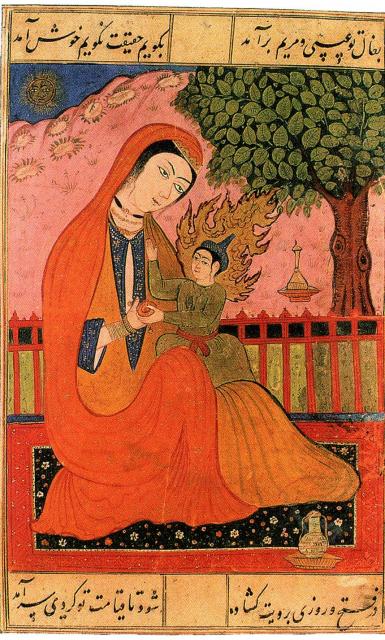In Islamic thought

Mary and Jesus in old Persian Shi'a miniature.
Another title frequently mentioned is al-Masīḥ, which translates to "the Messiah". This does not correspond to the Christian concept of Messiah, as Islam regards all prophets, including Jesus, to be mortal and without any share in divinity. Muslim exegetes explain the use of the word masīh in the Qur'an as referring to Jesus' status as the one anointed by means of blessings and honors; or as the one who helped cure the sick, by anointing the eyes of the blind, for example.[5] Qur'anic verses also employ the term "kalimat Allah" (meaning the "word of God") as a descriptor of Jesus, which is interpreted as a reference to the creating word of God, uttered at the moment of Jesus' conception;[27] or as recognition of Jesus' status as a messenger of God, speaking on God's behalf.[5]
[edit] Theology
Islamic texts regard Jesus as a righteous messenger of God, and reject the idea of him being God or the begotten Son of God. According to Islamic scriptures, the belief that Jesus is God or Son of God is shirk, or the association of partners with God, and thereby a rejection of God's divine oneness (tawhid) and the sole unpardonable sin.[28] All other sins may be forgiven through true repentance: shirk speaks of associating partners with God after having received the Divine Guidance, as it is said in the Qur'an and Hadith that when one submits to God (i.e. embraces Islam), their "accounts" (of sins and righteous deeds used to determine the standing of a person on the Last Day) are numbered from that moment. A verse from the Qur'an reads:The Christian doctrine of the Trinity is similarly rejected in Islam. Such notions of the divinity of Jesus, Muslims state, resulted from human interpolations of God's revelation. Islam views Jesus as a human like all other prophets, who preached that salvation came through submission to God's will and worshiping God alone. Thus, Jesus is considered in Islam to have been a Muslim by the definition of the term (i.e., one who submits to God's will), as were all other prophets in Islam.[31]In blasphemy indeed are those that say that Allah is Christ the son of Mary. Say: "Who then hath the least power against Allah, if His will were to destroy Christ the son of Mary, his mother, and all every - one that is on the earth? For to Allah belongeth the dominion of the heavens and the earth, and all that is between. He createth what He pleaseth. For Allah hath power over all things."
[edit] Precursor to Muhammad
| Lineage of six prominent prophets according to Islamic tradition | |||||||||||||||||||||||||||||||||||||||||||||||||||||||||||||||||||||||||||||||||||||||||||||||||||||||||||||||||||||||||||||||||||||||||||||||||||||||||||||||||||||||||||||||||||||||||||||||||||||||||||||
|---|---|---|---|---|---|---|---|---|---|---|---|---|---|---|---|---|---|---|---|---|---|---|---|---|---|---|---|---|---|---|---|---|---|---|---|---|---|---|---|---|---|---|---|---|---|---|---|---|---|---|---|---|---|---|---|---|---|---|---|---|---|---|---|---|---|---|---|---|---|---|---|---|---|---|---|---|---|---|---|---|---|---|---|---|---|---|---|---|---|---|---|---|---|---|---|---|---|---|---|---|---|---|---|---|---|---|---|---|---|---|---|---|---|---|---|---|---|---|---|---|---|---|---|---|---|---|---|---|---|---|---|---|---|---|---|---|---|---|---|---|---|---|---|---|---|---|---|---|---|---|---|---|---|---|---|---|---|---|---|---|---|---|---|---|---|---|---|---|---|---|---|---|---|---|---|---|---|---|---|---|---|---|---|---|---|---|---|---|---|---|---|---|---|---|---|---|---|---|---|---|---|---|---|---|---|
| |||||||||||||||||||||||||||||||||||||||||||||||||||||||||||||||||||||||||||||||||||||||||||||||||||||||||||||||||||||||||||||||||||||||||||||||||||||||||||||||||||||||||||||||||||||||||||||||||||||||||||||
| Dotted lines indicate multiple generations | |||||||||||||||||||||||||||||||||||||||||||||||||||||||||||||||||||||||||||||||||||||||||||||||||||||||||||||||||||||||||||||||||||||||||||||||||||||||||||||||||||||||||||||||||||||||||||||||||||||||||||||
[edit] Ascetic literature
Jesus is widely venerated in Muslim ascetic and mystic literature, such as in Muslim mystic Al-Ghazzali's Ihya `ulum ad-Din ("The revival of the religious sciences"). These works lay stress upon Jesus' poverty, his preoccupation with worship, his detachment from worldly life and his miracles. Such depictions also include advice and sermons which are attributed to him. Later Sufic commentaries adapted material from Christian gospels which were consistent with their ascetic portrayal. Sufi philosopher Ibn Arabi described Jesus as "the seal of universal holiness" due to the quality of his faith and "because he holds in his hands the keys of living breath and because he is at present in a state of deprivation and journeying."[5][edit] Ahmadiyya views
Main article: Jesus in Ahmadiyya Islam
The Ahmadiyya view of Jesus, while agreeing that Jesus was mortal, breaks with mainstream Islamic interpretation by asserting that Jesus was not raised alive to Heaven. They claim that he instead died a natural death in India, a position which they have adopted as a characteristic of their faith.
